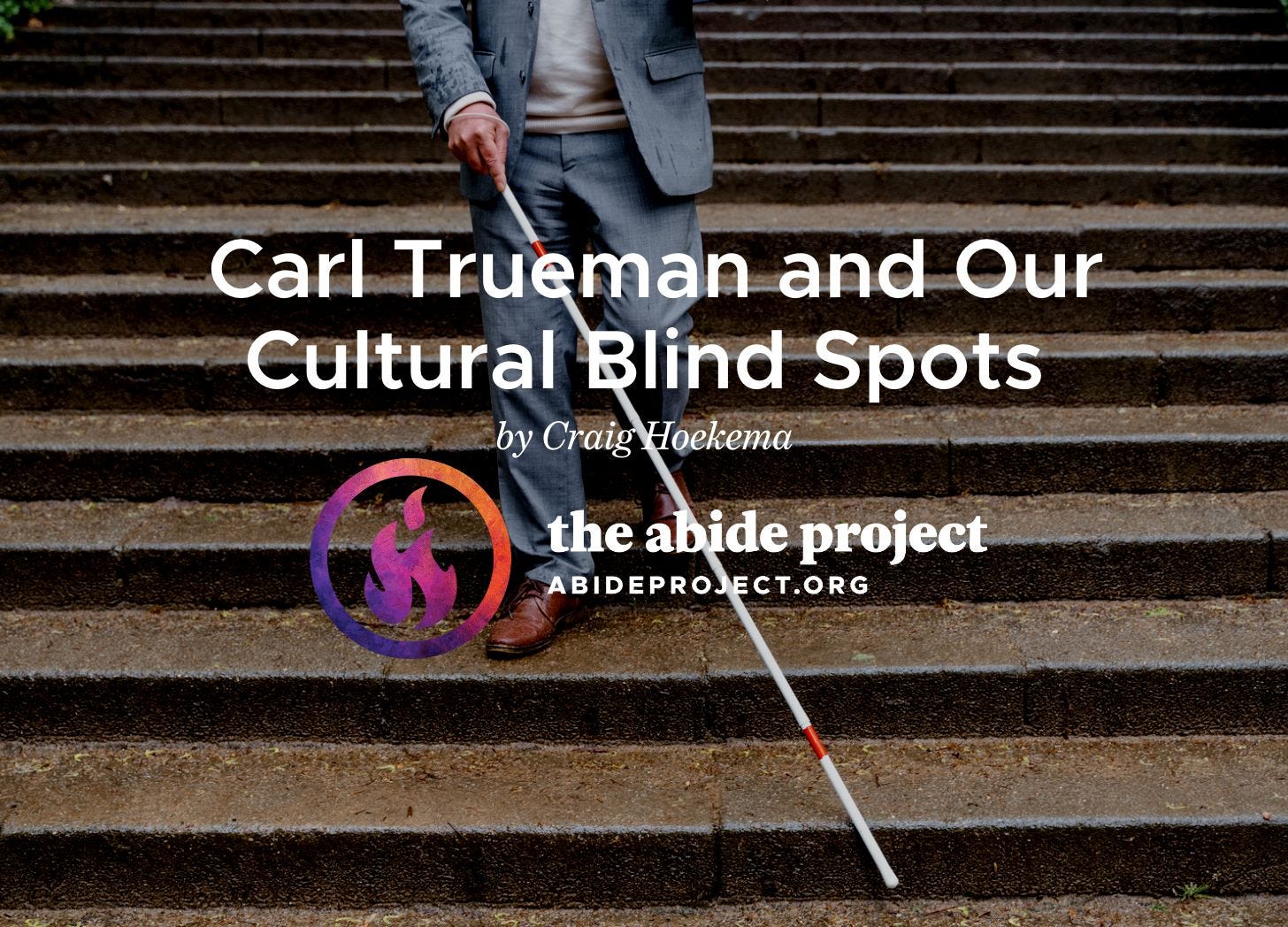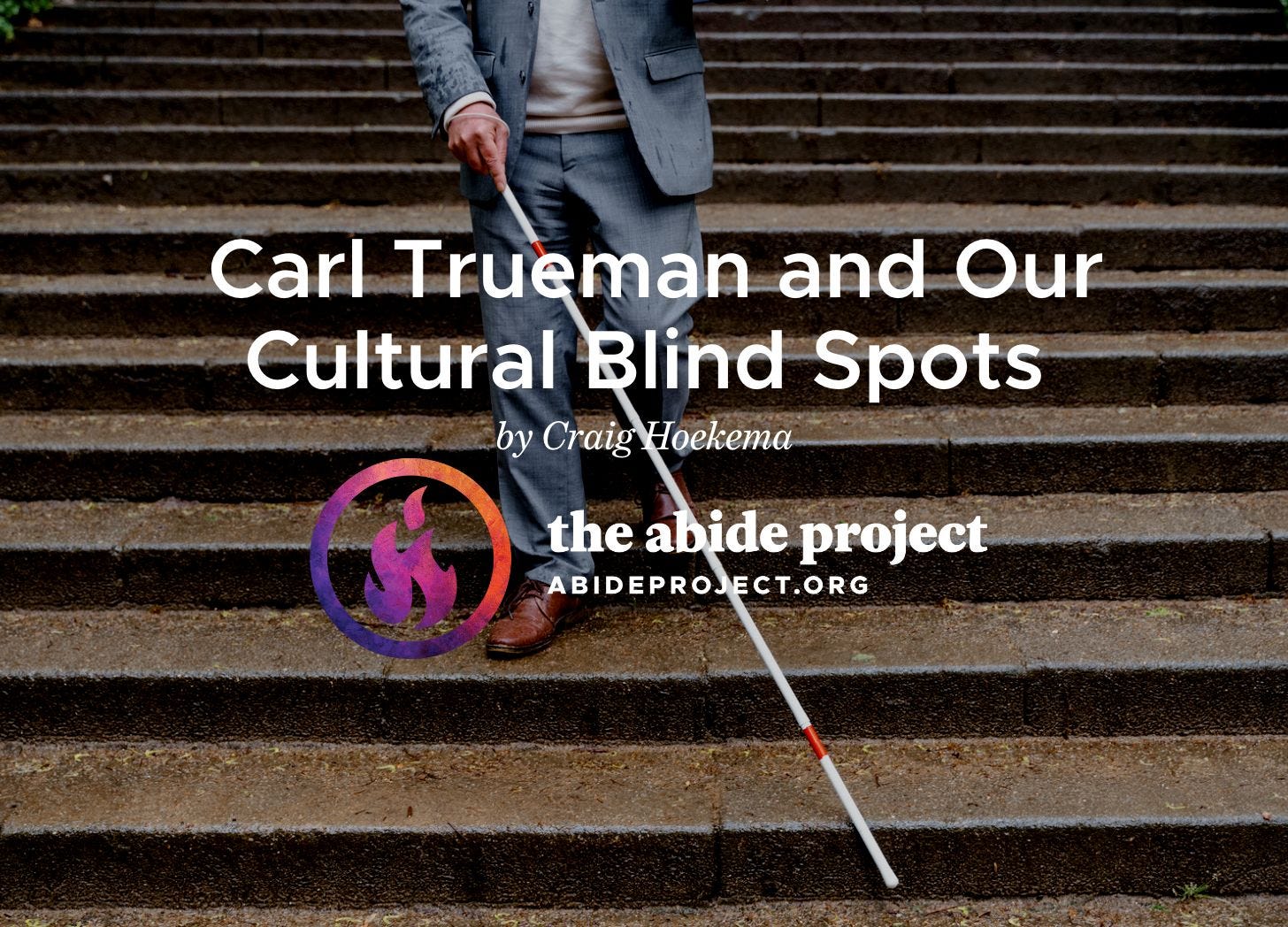Carl Trueman and Our Cultural Blind Spots
by Craig Hoekema
I think often of a question my church history professor used to ask. Inevitably we’d be studying some era in which Christians believed or practiced things that left us shaking our heads in disbelief. Yet as soon as we began to wag our metaphorical fingers in judgment at how blatantly our predecessors could ignore the Bible, my professor would pull us down from our self-appointed judgment seats and say, “Yes, they had cultural blind spots. But what are our cultural blind spots?” It was a wise reminder that Christians decades from now will be reading about us, and they may be inclined to shake their heads and wag their fingers in much the same way.
In his book, The Rise and Triumph of the Modern Self, historian Carl R. Trueman puts his finger on a series of modern blind spots all related to our understanding of what it means to be human. Especially in our age of unprecedented scientific advancement, we’re quick to associate what is modern with what is enlightened. However, Trueman exposes how many half-truths and outright lies we (yes, Christians included) have imbibed in our cultural moment, and how profoundly they distort and confuse our contemporary discussions of sexual morality.
In short, Trueman argues that unless we are thinking Biblically and critically about today’s deeply imbedded assumptions regarding sex and identity, we are likely (though probably unwittingly) standing less firmly on the foundation of Scripture than we are standing on the shoulders of Jean-Jacques Rousseau, Percy Bysshe Shelley, Friedrich Nietzsche, Charles Darwin, Karl Marx, and Sigmund Freud.
Trueman begins his historical survey in the 18th century with the Genevan philosopher Jean-Jacques Rousseau. Rousseau’s most salient contribution in this regard was his insistence that human beings are good by nature, and that it is only the corrupting influences of society that breed sin and wickedness. As such, we as individuals are at our best when we act in accordance with our own innate desires and feelings. “Authenticity” is key to a life well-lived—understood as the freedom to do and be as your inner impulses direct, unhindered by external influences
.
Next, Trueman explores how these ideas were popularized by late 18th and early 19th century poets like William Blake, William Wordsworth, and Percy Bysshe Shelley. Reinforcing Rousseau’s contention that authenticity is found by freeing oneself from the alien demands of civilization and looking inwardly, these men added both an emphasis on sex as being central to individual authenticity, and an animosity toward organized Christianity. By submitting to an external authority, particularly on matters of sexual morality, individuals plunge themselves into inauthentic existence. What constitutes healthy sexual behavior is to be determined by instinct and not by the oppressive dictates of religion.
Trueman then turns to the influence of 19th century thinkers like Nietzsche, Darwin and Marx. For the sake of brevity, Trueman’s argument can be summarized in his claim that, “all three in their different ways provided conceptual justification for rejecting the notion of human nature and thus paved the way for the plausibility of the idea that human beings are plastic creatures with no fixed identity” (pg. 166). In short, we are who we choose to be, and for Nietzsche in particular, the highest goal of all our self-creation projects is personal satisfaction.
But if there is a most important figure for understanding why we think about sex and identity as we do, it is arguably Sigmund Freud. For Freud too the goal of human existence was to be happy, but he gave happiness a specifically sexual turn in identifying it with genital pleasure. For Freud, sexual desire and fulfillment were the key to what it means to be human. With his five stages of psychosexual development (i.e. oral, anal, phallic, latency, genital), Freud contended that there is no stage in life in which sexual desire and its satisfaction are not foundational to human behavior. Trueman summarizes Freud’s influence this way: “before Freud, sex was an activity, for procreation or for recreation; after Freud, sex is definitive of who we are, as individuals, as societies, and as a species” (pg. 221).
It could probably go without saying that none of what is articulated in the previous four paragraphs harmonizes with the Biblical worldview, which is not surprising given that the thinkers mentioned above were decidedly if not enthusiastically not Christians. But the challenge for us as the 21st century church is to identify how much these ideas have yet imbedded their way into how we think about and talk about matters of human sexuality—particularly though not limited to gender identity and same-sex attraction. We ought not be naïve about how deeply we have imbibed from this polluted ideological well, and how much of our modern attempt to condone sexual ideas and practices that the historic church has never before condoned flows out of the profound confusion of our cultural moment.
Let me try to illustrate that in just a few ways.
How many of us, upon hearing that someone experiences same sex attraction have begun to put him or her, however subtly, into some other category of personhood? “Oh, you’re gay, lesbian, bisexual, etc…I didn’t realize you were that kind of person.” In so doing, we reveal an anthropology that’s much more Freudian that Biblical (check out Joseph Bowman’s plea not to be categorized this way HERE).
How many of us have heard, or have even found ourselves asking, “How could it be loving to tell someone never to engage in the kind of sex they most deeply desire? Is that not an assault on their very humanity?” In asking such questions, we find our thinking much more squarely aligned with Shelley and Nietzsche than with Scripture.
How many of us have heard, or even found ourselves thinking that to insist those with same-sex attraction limit themselves to either celibacy or opposite sex marriage is to insist they be untrue to who they really are? Such an assumption has more in common with Rousseau than with the Biblical understanding of what it means to be an authentic human being.
How many of us have heard, or have even found ourselves asking, “Didn’t the Apostle Paul just not understand the reality of sexual orientation and identity the way we now understand it?” Instead of asking the more self-critical question, “Might it be that the Apostle Paul actually understood the nature of sexual attraction and human identity better than we do in that he was unhindered by our modern confusions?”
How many of us have heard others equate, or have even found ourselves equating the following two statements: “They believe it’s not God’s will to act on same-sex desires” and “They’re against gay people.” The conflation of such statements once again reveals that the above-mentioned chain of thinkers holds great influence in our modern discourse—both outside and within the church.
Trueman’s book offers us a sobering yet necessary spotlight to illumine just a few of our current cultural blind spots. My submission is that the Christian Reformed Church stands badly in need of getting squarely re-centered on at least the following Biblical principles:
* human beings are not good by nature
* our inward desires are not reliable guides for how to live our lives
* authenticity means living in accordance with God’s will and design
* we are not our own and cannot choose who or what we want to be
* personal satisfaction is not the goal of life
* sex is not central to personal happiness
* sexual desire is not indicative of who you are
Until we can get unmistakably clear about these things, we’re destined to keep finding incredible the notion that God would limit sexual relationships to life-long unions of one man and one woman, and I suspect we may find tomorrow’s church history students shaking their heads at us.





Hi Craig,
After listening to your most recent discussions on how to navigate division within the church with two other pastors, I took note of the article you mentioned and searched it out on ABIDE site. Thank you for this! I appreciate what you have shared here as we don't seem to understand or acknowledge that when we are redeemed to a new life in Jesus Christ, we still battle the tendancies of our 'human nature' to be molded subtly into the ideologies of the world. This has happened over time and shows how important our foundations need to be. From our reformed perspective we must never forget from what the LORD has saved us when we were DEAD in our trespasses and sins, and though now saved, we still 'sin because we are sinners'. How soundly scripture reminds us over and over of our need to 'test ourselves' to make sure we are 'in the faith'. You have listed many things we seem to have 'lost' or 'forgotten' that have been drowned out through the constant influence of the 'world, the flesh and the devil' and this is indeed the challenge of a life that has been 'redeemed through the blood of the Lamb'. We are also reminded in the letters of the Apostles that 'the flesh' is constantly at odds with the 'the Spirit', and this battle will be with us until the Lord takes us home, or returns to take us to be with Him! Hearing, embracing and applying the Preaching of the 'whole counsel of God's Word' is the food that all believers require to grow spiritually strong. Without it, we are daily vulnerable to 'any wind of doctrine' that comes up, and with the speed of information we are bombarded with today it can be extremely confusing for those whose discernment is weak due to a lack of ambition to strengthen the foundations of our faith which we stand on. Thank you for encouraging us and reminding us again of the importance of knowing the Word, recognising the power of the world to influence us away from God and His Truth, and to test ourselves, and question how well we line up with the 'plumbline' of all that God has given us in His Word. Martin Luther said it this way:
"And though this world with devils filled should threaten to undo us, we will not fear for God has willed His truth to triumph through us.
The prince of darkness grim, we tremble not for him; his rage we can endure, for lo! his doom is sure: one little word shall fell him." Stanza 3 of "A Mighty Fortress is Our God"
Thank you again!
Marlene